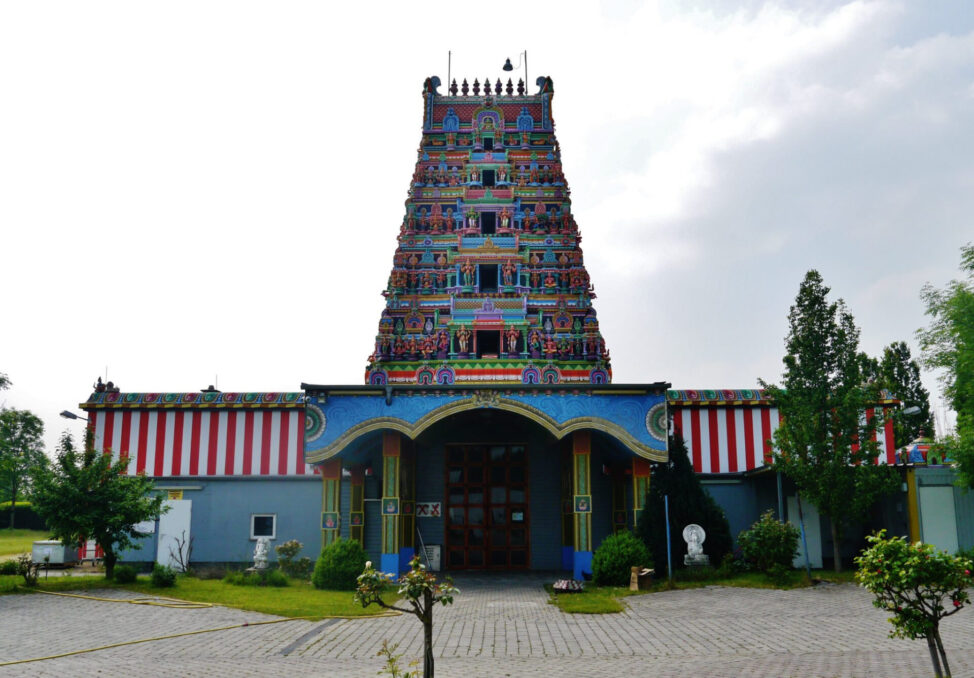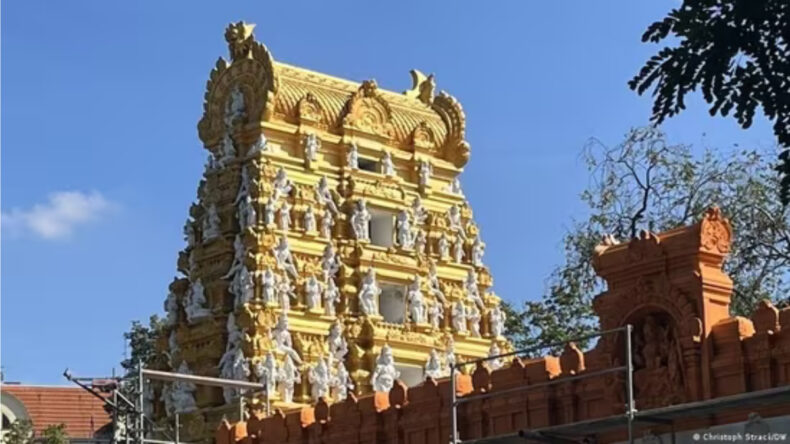The Berlin Hindu Mandir, Germany’s largest Hindu temple, is set to open in the coming months, a stunning tribute to cultural diversity and spiritual oneness. This monumental project has been in the works for nearly two decades, representing the metamorphosis of “guest workers” into Berliners as well as the city’s growing religious environment.

A 20-Year Journey: From Dream to Reality
Vilwanathan Krishnamurthy, a 70-year-old Berliner, set out almost two decades ago on a journey to build a Hindu temple in Berlin. His vision is coming to life as he happily supervises the temple’s development. Krishnamurthy, who arrived in West Berlin nearly 50 years ago as a “guest worker,” started off working for an electrical company for three Deutschmarks per hour. He later formed an organisation with the goal of erecting a Hindu temple in the city.
Krishnamurthy’s ambition was to provide a location where Hindus and others could join together to celebrate their beliefs. “As a Hindu, I can celebrate everything at home, but I can’t celebrate it with other people,” he explained. It necessitates a place to celebrate with others, with friends, and to enjoy oneself.
The road to fulfilling this desire was long and difficult. The Sri-Ganesha Hindu Temple group was founded in 2004, and a tract of land on the outskirts of Hasenheide park, between Kreuzberg, Neukölln, and Tempelhof, was quickly provided for the temple’s construction. However, funding proved to be a serious impediment. Krishnamurthy recalled the various stages of the German construction process, including regulations, approval procedures, timeframes, and funding arrangements.
Surprisingly, the temple was totally sponsored by the foundation’s own donations, with no assistance from government officials. Krishnamurthy showed sympathy, stating, “We didn’t want to build a temple on credit.” Our descendants would have had to pay it back eventually. As a result, we were reliant on donations.”
Berlin’s Growing Indian Community
The construction of the Berlin Hindu Mandir is not only a local narrative; it also represents the impact of the global economy during a digital boom. The Indian embassy claims that up to 15,000 Indians dwell in Berlin, but other estimates suggest that up to 20,000 Indians live in the German city. The appeal of Berlin to young Indian professionals in the IT industry has played an important part in this demographic shift.
The “Amazon Tower,” Berlin’s highest under construction building, is only three km away from the temple site. Many young Indians working in the computer industry in Berlin have kindly donated to the temple’s development. Krishnamurthy noted that these people, like himself in the past, sought the comfort of rituals from their own country but had limited time due to work commitments. Thus, they eagerly await the temple’s completion.
The influx of donations has accelerated the construction process, with up to 50 specialist temple craftspeople, known as sthapati, working on-site during the European summer. The temple’s exterior is already resplendent with bright colors, and an almost 18-meter (60-foot) high tower stands as a striking feature.
A Spiritual Oasis and Place for Dialogue
Krishnamurthy emphasised the temple’s spiritual value, which is devoted to Lord Ganesha. He stated that the temple’s deities are being constructed in India to 5,000-year-old specifications, and that there would be a total of 27 of them. The interior of the temple is awaiting their installation, and Krishnamurthy is looking forward to the six-day consecration event in November.
For him, the temple is more than just a religious centre; it is also a place of community and dialogue. He enjoys the multicultural nature of his neighbourhood, which is home to people from all over the world, and he maintains relationships with people of all religions, including the imam of a neighbouring mosque and a Protestant pastor.
Finally, the upcoming opening of the Berlin Hindu Mandir is a monument to Berlin’s Indian community’s persistence, dedication, and generosity. It represents the spirit of cultural variety and interfaith conversation that enriches the city, providing a gathering space for people of all backgrounds to celebrate and unite. Vilwanathan Krishnamurthy’s goal is coming true, and the temple’s opening will be a watershed moment in Berlin’s religious and cultural environment.












